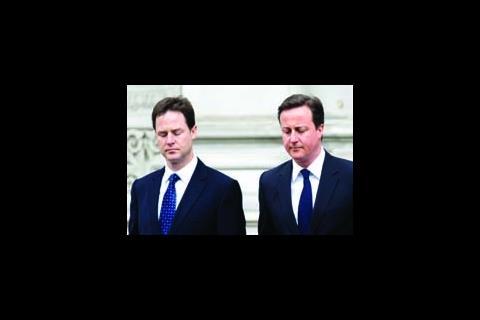Fears grow for future of Crossrail, hospitals and housing as Tories apply spending brakes
The industry voiced its anxiety about the prospect of public spending cuts as the Conservative-Liberal Democrat coalition government began its first days in power.
Amid widespread uncertainty over the extent of any cuts, senior industry figures have expressed fears that the axe will now start to fall on capital spending. Areas of particular concern were:
Crossrail
The Conservatives gave assurances in the run-up to the election that London’s £16bn east–west train link would not be affected, but the chief executive of one major contractor said they did so only “after coming under a lot of pressure. I’d say they have about a week to make their position clear and either back it or say there will be cuts.”
Another senior contracting source with links to Whitehall, said: “My feeling is that the Tories won’t commit major funds to Crossrail for two years.”
Other sources were more upbeat. The boss of a large consultant said: “With £1.5bn committed so far, it would be difficult to turn back. Contracts have been signed feverishly over the past few months with exactly that in mind.”
Social housing
The Homes and Communities Agency (HCA), which spends between £5bn and £6bn a year, has been allocated funding until next April. Although immediate cuts have not been threatened, a senior HCA source said there were “no guarantees”. The Conservatives have not made any commitment to preserving spending on social housing, and many are expecting cuts of up to 20% in 2011.
Planning and private housing
Housebuilders have given the coalition a cautious welcome as doubts persist over how negotiable elements of the Tory’s recent planning green paper are.
These include the removal of planning targets as part of the party’s localism agenda and the introduction of a third-party right of appeal. More alarmingly for the industry, the Lib Dems have talked about imposing VAT on new housing.
The chief executive of one major housebuilder said: “I’ve been to meetings and what Grant Shapps said six months ago and what he says today are different things. I think there’s scope for flexibility as the party realises the practicalities of life.”
My feeling is that the Tories won’t commit big funds to Crossrail for two years
Contracting source
His comments were backed up by a senior director at a medium-sized housebuilder, who dismissed Tory proposals for a third-party right of appeal as “electioneering”.
John Stewart, director of economic affairs at the Home Builders Federation, said he thought the abolition of planning targets was sure to go ahead, but there might be flexibility on the right of appeal.
“Removing the targets is a big leap of faith and puts enormous onus on local authorities to come up with sufficient housing. There need to be some disciplines to encourage councils to perform.
“One area where we hope they are willing to cede ground is the third-party right of appeal, which we find vexatious and hope is not fundamental to their plans.”
In relation to the Lib Dems’ proposal for VAT, Stewart said: “We’d oppose that very strongly. It could only be done at the expense of something else, like affordable housing, or it would force the value of land down.”
As one City analyst pointed out this week: “When you think that the government is the biggest landowner in the country, it seems even more unworkable.”
Prisons
Few fears have been raised about the continuation of Labour’s £5.4bn prison building programme. One source close to the programme said the level of spending would probably not be affected.
Other areas
The coalition has pledged to scrap the third runway at Heathrow airport and has also ruled out additional runways at Gatwick and Stansted.
It has committed itself to a high-speed rail network but agreed routes have not been specified.
Can firms claim costs for scrapped schemes?
Stephen Matthew, a partner in commercial law firm Nabarro, explains…
“There’s no precedent in BSF for getting bid costs back. The only document anyone can refer to is the invitation to participate and I’d expect them all to contain the standard reference to bidding at risk. Any authority doing anything different to the norm would have been very ill-advised and I certainly haven’t seen anything different. If a contractor runs to an individual authority that has pulled the plug I think the answer will be, ‘well where do you expect us to find half a million to pay you with?’. The only way contractors have any hope is if they go to the Treasury en masse with a sob story. In theory they could have a case, but it would be a lawyer’s field day to work out a basis of claim. This is uncharted water.”
 Andrew Lansley, health secretary
Andrew Lansley, health secretary
Formerly Norman Tebbit’s private secretary and an active Conservative since the eighties. Helped get John Major elected in 1992. Has been the shadow health secretary since 2003 and key in demonstrating Tory commitment to NHS.
 Chris Huhne, energy and climate change secretary
Chris Huhne, energy and climate change secretary
Former journalist who made his fortune in the City and served as an MEP. Competed with Clegg for the Lib Dem leadership in 2007.
 David Laws, chief secretary to the Treasury
David Laws, chief secretary to the Treasury
Former investment banker. Worked in party’s Treasury team, and work and pensions. Was part of the negotiating team after the election.
 Iain Duncan Smith, work and pensions
Iain Duncan Smith, work and pensions
The former Conservative leader will be overseeing the future of the Health and Safety Executive. The Tories have said they will professionalise the HSE and push towards private responsibility.
 George Osborne, chancellor
George Osborne, chancellor
David Cameron’s closest chum and MP for Tatton since 2001. He was promoted to the role of shadow chancellor by Michael Howard in May 2005. His position will retain responsibility for banking and financial regulation.
 Michael Gove, education secretary
Michael Gove, education secretary
Former Times journalist, Building columnist and member of Cameron’s inner circle. As shadow minister was critical of home information packs.
 Vince Cable, business secretary
Vince Cable, business secretary
A former economist, he was the Liberal Democrat Treasury spokesman and was dubbed a financial doyen after warning about the credit crunch.
 Eric Pickles, communities secretary
Eric Pickles, communities secretary
The Conservative’s party chairman. In 2006 a chip shop in his Brentwood community launched a pickled egg in his honour. Has championed more control for local authorities on their housing strategies.





























1 Readers' comment